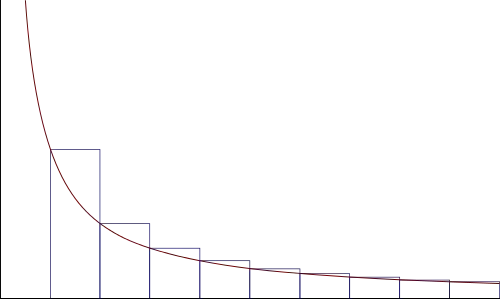Integral Test
The next test for convergence for infinite series is the integral test. The integral test utilizes the fact that an integral is essentially an Riemann Sum—which is itself an infinite sum—over an infinite interval which is useful because integration is relatively straight forward and familiar.
The test is as follows:
If a series , and if the discrete function is continuous and decreasing on the interval then if
- is convergent, so is
- is divergent, so is
Let us look at why this this test works. As an example, we'll use the harmonic series . The harmonic series is well known series that actually happens to be divergent. This series actually passes the limit test, however it does not pass the integral test. If we want to approximate the integral, we can use rectangles like in a Riemann Sum:

Note that this right-handed method will always under approximate the integral (assuming that the function is decreasing on our selected interval). This implies that if the right-handed sum is equal to the actual infinite series, then the integral itself must be greater than the sum. This can help show convergence, because if the integral from the starting point to infinity is convergent, then by the comparison test the original function on that interval must also be convergent. And so we can see that the integral test is actually a "special case" of the comparison test.
But what about divergence? This case is also satisfied—if we use a left-handed approximation instead of a right handed one, we see that we again attain the original series, however there is an important difference:

The key difference, in this case, is that the integral becomes an under approximation for the series, and we can use the new "series" of the integral to show divergence with the comparison test.
This test is useful but is unfortunately only useful on functions that can be integrated and are decreasing in size. The latter may seem like a trivial and unnecessary addition, however consider how this test works; it relies on the fact that the integral of a function decreasing on an interval will always yield an under/over approximation of a series; if the function is not decreasing everywhere on the interval, the integral will not necessarily yield an under/over approximation every time.
Example 1
Use the integral test to determine if the following series is convergent or divergent:
Solution
The improper integral from returns . The limit of the first term is zero, and so because the integral converges the series does too.
Example 2
Determine if the series converges or diverges.
Solution
This series does not pass the first requirement that the series is decreasing over the desired interval; . Applying the integral test would still show the series' convergence.
Example 3
Determine if the series converges or diverges.
Solution
However, this series is not decreasing everywhere on the interval. However, it has a relative maximum at , after which it does decrease forever. And so we can write this series as . Integrating the function yields the improper integral from to infinity, which converges, and so the series converges too.